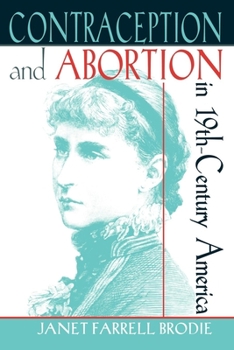Contraception and Abortion in Nineteenth-Century America: A Critical Edition of the "symphonia Armonie Celestium Revelationum" (Symphony of the Harmon
Select Format
Select Condition 
Book Overview
In pocket-sized, coded diaries, an upper middle-class American woman named Mary Poor recorded with small "x's" the occasions of sexual intercourse with her husband Henry over a twenty-eight-year period. Janet Farrell Brodie introduces this engaging pair early in a book that is certain to be the definitive study of family limitation in nineteenth-century America. She makes adroit use of Mary's diaries and letters to lift a curtain on the intimate life of a Victorian couple attempting to control the size of their family. Were the Poors typical? Who used reproductive control in the years between 1830 and 1880? What methods did they use and how did they learn about them? By examining a wide array of sources, Brodie has determined how Americans gradually were able to get birth control information and products that allowed them to choose among newer, safer, and more effective contraceptive and abortive methods. Brodie's findings in druggists' catalogues, patent records, advertisements, "vice society'' documents, business manuscripts, and gynecological advice literature explain how information spread and often taboo matters were made commercial. She retraces the links among obscure individuals, from itinerant lecturers, to book publishers, to contraceptive goods manufacturers and explains the important contributions of two nascent networks-medical practitioners known as Thomsonians and watercurists, and iconoclastic freethinkers. Brodie takes her narrative to the backlash at the end of the century, when American ambivalence toward abortion and contraception led to federal and state legislative restrictions, the rise of special "purity legions," the influence of powerful reformers such as Anthony Comstock, and the vehement opposition of medical professionals. In this balanced and timely book Brodie shows a keen sensitivity to the complex factors behind today's politically, emotionally, and intellectually charged battles over reproductive rights.
Format:Paperback
Language:English
ISBN:0801484332
ISBN13:9780801484339
Release Date:April 1997
Publisher:Cornell University Press
Length:392 Pages
Weight:1.30 lbs.
Dimensions:1.0" x 6.2" x 9.3"
Age Range:18 years and up
Grade Range:Postsecondary and higher
Customer Reviews
1 rating
Parting the Gilded Curtain
Published by Thriftbooks.com User , 24 years ago
We are so dazzled by the gilded Victorian that we often refuse to look at the evidence of ordinary human needs and desires in the 19th century. Ms Brodie examines 100 years of attitudes and practices regarding an important aspect of marital reality -- the need to limit family size. The result is a fascinating examination of a topic that is usually ignored and often considered either non-existent or unimportant. Ms Brodie's energetic presentation is both analytical and scholarly with conclusions carefully supported by contemporary documentation. She also adds delightful textual flavor and dimension by threading excerpts from diaries and letters throughout her narrative.The examination of Mary Pierce Poor's diary is illustrative. This unusual journal carefully records menstrual cycles and sexual contacts with Mary's husband Henry Varnum Poor from 1845 to 1868. When considering sexual abstinence as a birth control method, Ms. Brodie sees little evidence of this practice in the marital lives of the Poors, but does think that in 1851 they tried a physical separation for the summer to prevent conception. She quotes from Mary's diary to prove that this was not a happy solution. "I do not like to be long separated from you. We are happiest together, do not let us try absence again. I want to be with you, wherever you are, the rest of the summer, the rest of my life." Obviously, Mary enjoyed her conjugal pleasures, even if she was continuously worried about another pregnancy. Overall this book is a extraordinary peak into the marital mores and realities of the Victorian period. It leaves no doubt that our ancestors grappled with the issues of family limitation and sexuality as rigorously as we do today. Terrific read. Great reference. Wonderful information.





